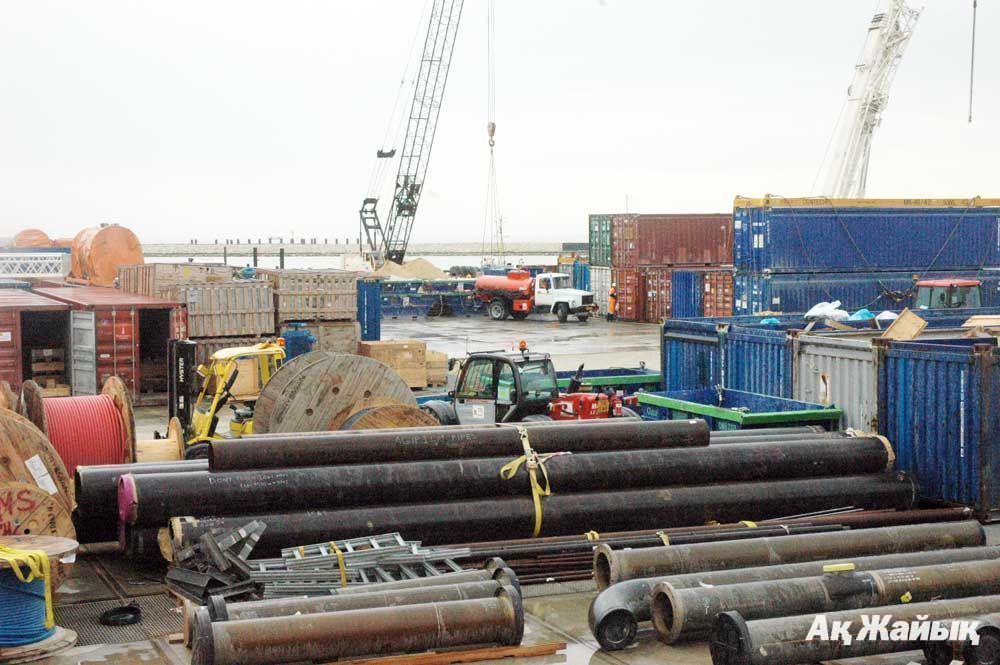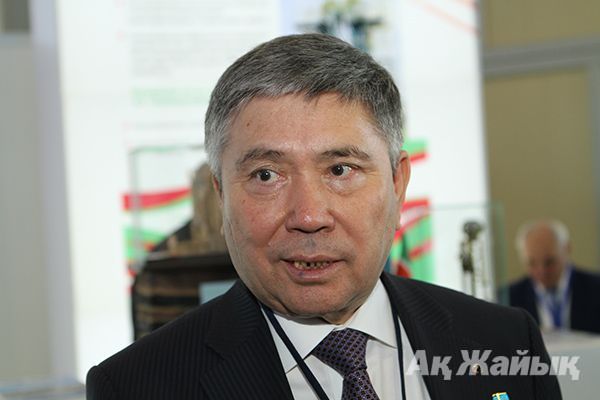By Laura Suleimenova
 According to PSA (Production Sharing Agreement) Kazakhstan will not refund NCOC’s expenses for renewal of production at Kashagan. According to preliminary estimates, the cost of pipelines replacement will make about $3 billion. But it seems that the matter is not only in pipes.
According to PSA (Production Sharing Agreement) Kazakhstan will not refund NCOC’s expenses for renewal of production at Kashagan. According to preliminary estimates, the cost of pipelines replacement will make about $3 billion. But it seems that the matter is not only in pipes.
“ALL ISSUES SETTLED”
After our publication “Saipem and Bonatti will work on pipeline replacement?" we sent inquiries to the RoK Ministry of Energy and to PSA LLP that operates a share of Kazakhstan in the North Caspian project.
In his written answers to “Ak Zhaik” newspaper enquiries the first Vice-Minister of Energy Uzakbai Karabalin reported that currently the researches are on the final stage of establishment the reasons for pipelines failure. The final report will be published in 2015. According to preliminary information, the main reason for pipes and welded seams cracking are the existence of increased hardness zones on the metal that are susceptible to impact of sour media under pressure.
“Please be informed that the Agreement was signed on December 13, 2014 between RoK and the Contract companies of the North Caspian project where among other items the issue connected with the “primary” pipeline has been settled (see the link: http://energo.gov.kz/index.php? id=2013).
 First Vice-Minister of Energy Uzakbai KarabalinIn particular, the Contractor and the Republic agreed that all expenses connected with the design, production, maintenance, operation of “primary” pipelines are non-refundable, and respectively, the Republic will not incur any looses in this regard”.
First Vice-Minister of Energy Uzakbai KarabalinIn particular, the Contractor and the Republic agreed that all expenses connected with the design, production, maintenance, operation of “primary” pipelines are non-refundable, and respectively, the Republic will not incur any looses in this regard”.
AkZhaik: Who specifically among Agip KCO managers or other companies - the project participants, will bear responsibility for pipelines failure: the supplier of low-quality pipes or the companies that laid them? And what is the scope of responsibility of “KazMunaiGas” seconded reps who represent the Kazakhstan party in NCOC and PSA LLP?
- “The issue of Contractor’s responsibility (Agip KCO and other companies – the participants of the project) was also settled by signing of this Agreement. KazMunaiGas or PSA LLP employees have not been directly involved in the construction of “primary” pipelines. According to PSA terms all responsibility for conducting oil operations fully lies on the Contractor of the project”. (Under the term “Contractor” the NCOC consortium is meant. Currently the participants of the project are seven companies with following shares: “Agip Caspian Sea B. V.” with 16.807%, “CNPC Kazakhstan B.V.” with 8.332%, “ExxonMobil Kazakhstan Ink.” with 16.807%, “Inpex North Caspian Sea, Ltd.” with 7.563%, “KMG Kashagan B.V.” with 16.877%, “Shell Kazakhstan Development B.V.” - 16.807%, “Total E&P Kazakhstan” -16.807%. Comments by L. S.)
“CONTRACTS HAVEN'T BEEN SIGNED YET”
Ak Zhaik: During recent public hearings in Atyrau the answers have not been given as to who will fabricate new pipelines for Kashagan project, what will be their cost and what companies will lay them. Why NCOC has chosen an Italian company “Bonatti” for on-shore pipeline laying if a few years ago this company allowed major fuel spill on Bolashak plant territory? Besides, Bonatti’s price proposal was higher than it was envisaged in the project.
- “According to our information, Contractor has not awarded the contract for pipeline laying to Bonatti. The Ministry also does not have any information about inclusion of Bonatti into Agip KCO’s “black list”, therefore, we cannot comment on this. As for new pipelines, currently the Operator is conducting commercial negotiations directly with several global manufacturers of pipes. The final cost will be known after completion of negotiations and contract award, taking into account the specifics of the purchased pipes”.
Ak Zhaik: During public hearings Stephan de Mayo, NCOC Managing Director, informed that the Kazakhstan party will not suffer expenses on replacement of pipeline. Pipes will be replaced at the expense of foreign partners of the North Caspian project.
- “That's rignt, according to Production Sharing Agreement all expenses connected with renewal of production at Kashagan field will not be allocated to reimbursable expenses, i.e. they will be financed by the contract companies”.
“WE WORKED ONLY WITH CONCRETE!”
From the answers given by the Ministry of Energy it follows that the employees of the Ministry, as well as PSA LLP, had no access for construction supervision of pipes that later failed. But the other minister, now the ex- minister of environmental protection Nurlan Kapparov - as one of the owners of Lancaster Group Kazakhstan (whose subsidiary is ERC Holding LLP) was involved in the project. In 2003 ERC Holding and the Italian Saipem International B.V. (ENI Group Company) formed Ersai Caspian Contractor joint venture that according to information on their corporate website, later completed a few contracts on Kashagan project. Practically all contracts were completed as per Agip KCO’s request: 1. Piping and commissioning at offshore D and A island platforms (May, 2007 - December, 2011). Activities included: Design engineering, construction, assembly, procurement with equipment and work sites arrangements, project management, offshore modules management, commissioning. 2. Commissioning of electrical generating modules and modules for sour gas re-injection for Kashagan field (2007-2011). 3. Purchasing, construction, fabrication and installation of foundation piles and flares for the 1st phase of Kashagan project (2004-2010). 4. Concrete weight coating of Kashagan - Karabatan trunkline (2005-2010), project scope: -25 000 pipes.
It follows from this information, that if all Kashagan contracts are specified, of course, then participation of Ersai Caspian Contractor LLP in the project is limited to concrete works.
The same follows from the official statement made on company website: “In order to avoid further conjectures and nonprofessional speculations in this regard, we emphasize that concrete weight coating of pipes was performed by Ersai Caspian Contractor LLP in Kuryk with the purpose of protecting from external, mechanical damages of pipes, as well as to avoid pipeline floating-up.
Besides, our company coated pipes with concrete over the existing vendor’s polypropylene corrosion-resistant coating. We would like to pay mass media’s attention to the official statement made by NCOC about the reasons of gas leak on the pipeline, which reads that “a direct cause of gas leak is the sulphide stress cracking”. In other words, cracks on a pipe were formed inside and not outside the coating”. In other publication Ersai reports that the limited liability partnership didn't sign any contracts for pipes delivery and didn't carry out any welding or pipeline laying activities at the Kashagan field.
DO YOU REMEMBER HOW IT ALL STARTED?
But regardless of Ersai’s whatever actual participation in ill-fated pipeline project, today some experts consider that the matter is far more wider than defective pipes. Here what one of them says:
- To find global reasons of failure at Kashagan you need to seek at the beginning of the project. All capital equipment was purchased since 2005 with the view that oil production will start in 2008. It was necessary to install straight away all equipment arriving in a continuous stream, but the project was delayed late, broke and transferred, construction terms. The equipment for many years stood idle in the open-air. Subject matter experts mobilized to the project were also waiting for the commencement of works. Months passed by, the activities were not commencing, contractors channeled their workforces to other scopes, all other negative moments started from here.
As for the failure of pipelines, then there are three reasons that cumulatively could lead to cracking. 1. Increased hardness of pipe material that causes fragility. 2. Presence of wet hydrogen sulfide that corrodes metal. 3. Tensile strength(pressure in the pipeline). It is believed that increased hardness of some zones on the pipeline located close to welding joints appeared as a result of welding specs violation. And presence of water, which is unacceptable in the content of gas, was due to malfunction in the gas drying system at the offshore technological complex. In my opinion, the pipe grade was selected correctly and corresponded to service conditions at Kashagan. Similar pipes are used in gathering systems of Tengiz and Karachaganak projects. Most likely, at Kashagan the violation of welding specs and subsequent pipeline testing took place during construction, conservation and storage, as well as equipment operation problems at the initial stage of the field start-up.
The assumption that the offshore complex has problems is toned up by the information that besides pipelines NCOC intends to replace compressors at the offshore complex.
- These compressors are designed for pressurization of gases of average and low pressure that are generated in vessels during process operations up to high pressure gases that are required for operation of gas treatment units. Perhaps, NCOC understands that this equipment can create problems during re-start. Then how did they select such equipment for the project, -wonders our source.
What will be the sum of compressors’ replacement? Will it be non-refundable sum for the Kazakhstan party? Will the project require an additional gas preparation unit? According to project participants, moisture in pipelines appeared in the very first days of testing oil production at Kashagan. All these issues are alarming, therefore the national company KazMunaiGas , as one of the consortium participants, will also finance these activities, in proportion to its share.
 В Атырау -10
В Атырау -10